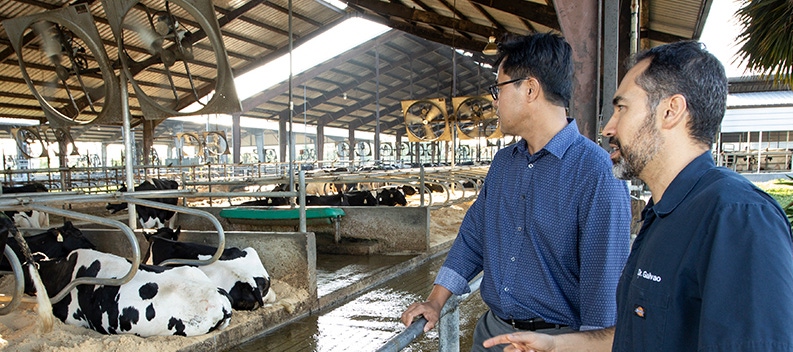University of Florida researchers using $460,000 grant to combat antibiotic-resistant infections in dairy cattle.
August 20, 2019

University of Florida scientists believe they can develop new antimicrobials that will benefit dairy cattle and, eventually, people by treating bacteria that normally resist antibiotics.
The uterine disease metritis costs U.S. dairy producers $600 million a year, according to KC Jeong, an associate professor of animal sciences at the University of Florida Institute of Food & Agricultural Sciences (IFAS). Jeong plans to use a nearly $460,000 grant from the National Institute of Food & Agriculture to make cattle bacteria less resistant to antibiotics and, therefore, more treatable.
Jeong said he and his colleagues started their research in August at the University of Florida Dairy Unit in Hague, Fla.
“We expect the development of new nano-sized antimicrobials will help improve animal and human health,” said Jeong, who’s also affiliated with the University of Florida Emerging Pathogens Institute. “Furthermore, scientists will be able to use our research as a framework to treat infections in people.”
Building on his own earlier findings and data from other scientists worldwide, Jeong will lead research into whether compounds such as chitosan nanoparticles — which help carry drugs to infection sites — empower antibiotics to cure cattle infections. Jeong’s previous research showed that chitosan nanoparticles themselves have strong antimicrobial properties.
As part of their experiments, the researchers will inject a combination of traditional antibiotics and chitosan nanoparticles directly into infection sites in cattle. They’ll also perform tests in the lab and in animals to pinpoint how this combination drug delivery works.
Among other goals, Jeong and his research team hope to effectively treat metritis in dairy cows. Metritis is a disease of the uterine lining that affects 20-40% of postpartum dairy cows, he said.
“By testing a combination of materials, we hope to increase the rate at which we can help cure diseases caused by drug-resistant bacteria. That will help improve animal and human health,” Jeong said. “Moreover, the study will become a new framework to develop treatment options for diseases caused by multi-drug-resistant pathogens.”
Jeong’s research team includes Dr. Klibs Galvao, an associate professor in the University of Florida College of Veterinary Medicine, and Zhaohui Tong, a IFAS associate professor in agricultural and biological engineering.
You May Also Like


.png?width=300&auto=webp&quality=80&disable=upscale)
